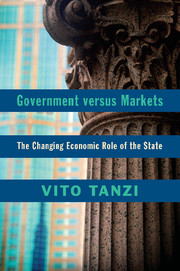Book contents
- Frontmatter
- Contents
- Preface
- PART ONE THE ECONOMIC ROLE OF THE STATE
- PART TWO HISTORICAL REVIEW
- 2 The Role of the State in the Pre–World War II Period
- 3 Forces That Changed the Role of the State
- 4 Growth of Public Spending and Taxation in the 20th Century
- 5 The Role of the State in Social Protection
- 6 Globalization and Public Spending
- PART THREE THEORETICAL AND ANALYTICAL ISSUES
- PART FOUR THE OUTCOME OF STATE INTERVENTION
- PART FIVE ON THE ECONOMIC ROLE OF THE STATE IN THE FUTURE
- Notes
- Index
- References
3 - Forces That Changed the Role of the State
Published online by Cambridge University Press: 07 October 2011
- Frontmatter
- Contents
- Preface
- PART ONE THE ECONOMIC ROLE OF THE STATE
- PART TWO HISTORICAL REVIEW
- 2 The Role of the State in the Pre–World War II Period
- 3 Forces That Changed the Role of the State
- 4 Growth of Public Spending and Taxation in the 20th Century
- 5 The Role of the State in Social Protection
- 6 Globalization and Public Spending
- PART THREE THEORETICAL AND ANALYTICAL ISSUES
- PART FOUR THE OUTCOME OF STATE INTERVENTION
- PART FIVE ON THE ECONOMIC ROLE OF THE STATE IN THE FUTURE
- Notes
- Index
- References
Summary
The Impact of the Industrial Revolution and Reactions to It
Between 1776, when Adam Smith published The Wealth of Nations, and the period around World War I, several important developments took place in the now industrialized countries. These developments changed dramatically the world that had existed until Smith's time. They contributed to putting pressure on the limited role of the state and on the level of public spending, conceptualized by Adam Smith, which had prevailed during the laissez-faire period, especially until sometime around 1880. They also stimulated various nongovernmental responses to these developments. Smith had written his book at the very beginning of the Industrial Revolution, when the world was not much different from that at the time of the Roman Empire, and before that “revolution” would start changing the economic and social relations that had existed. “[The] industrial revolution was the most revolutionary of all revolutions” because it changed radically the world that had existed before (Ricossa 2006, p. 63, my translation). At the time Smith wrote The Wealth of Nations, most people lived in rural areas and did not vote, and governments mostly represented the rights of the ruling class against the masses.
The Industrial Revolution, together with the political movements that accompanied it, in part as the outcome of the French and perhaps the American revolutions and of new political thinking, would in time transform the character of the economies and of the economic and social relations in the advanced countries.
- Type
- Chapter
- Information
- Government versus MarketsThe Changing Economic Role of the State, pp. 72 - 91Publisher: Cambridge University PressPrint publication year: 2011



